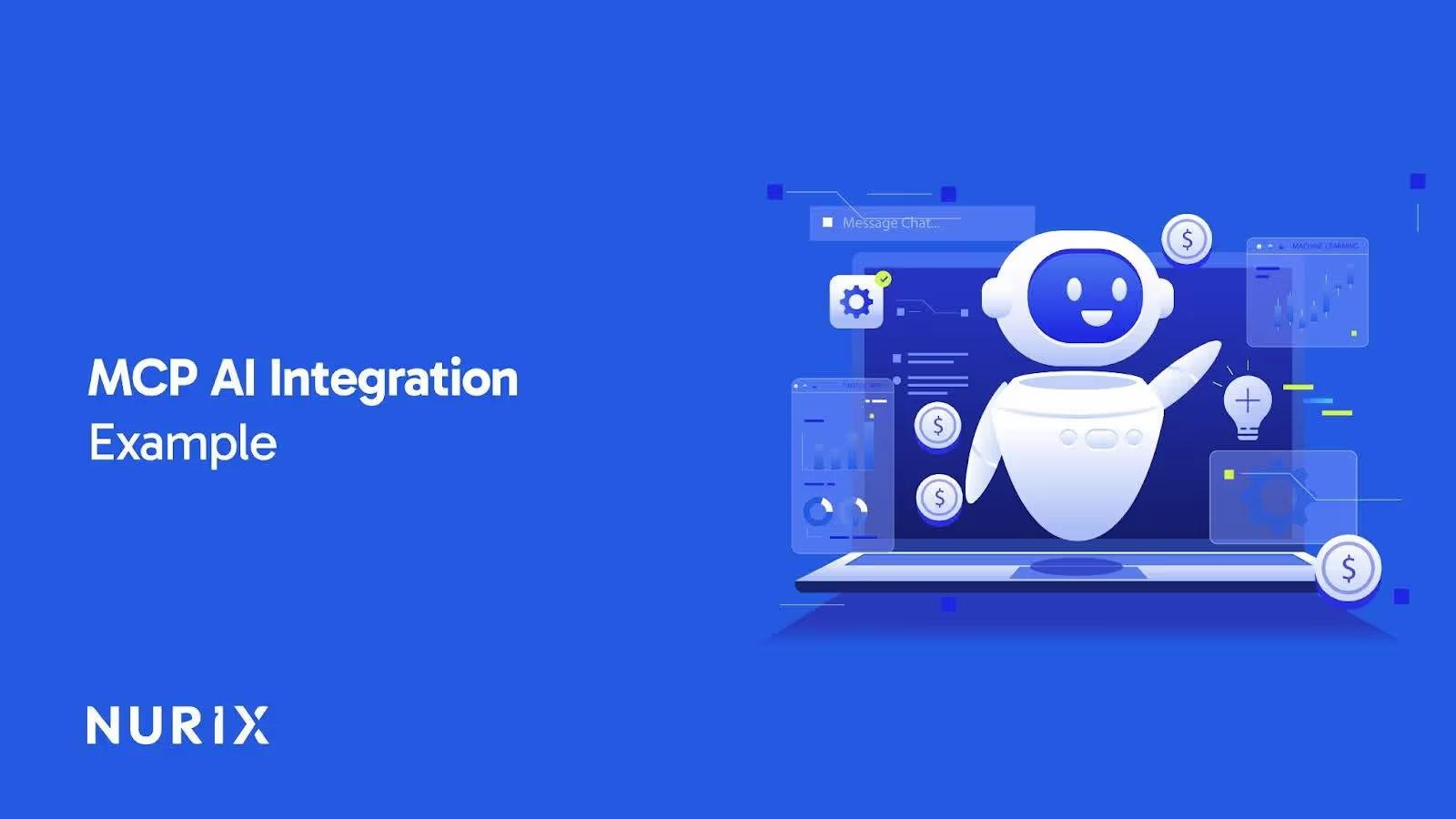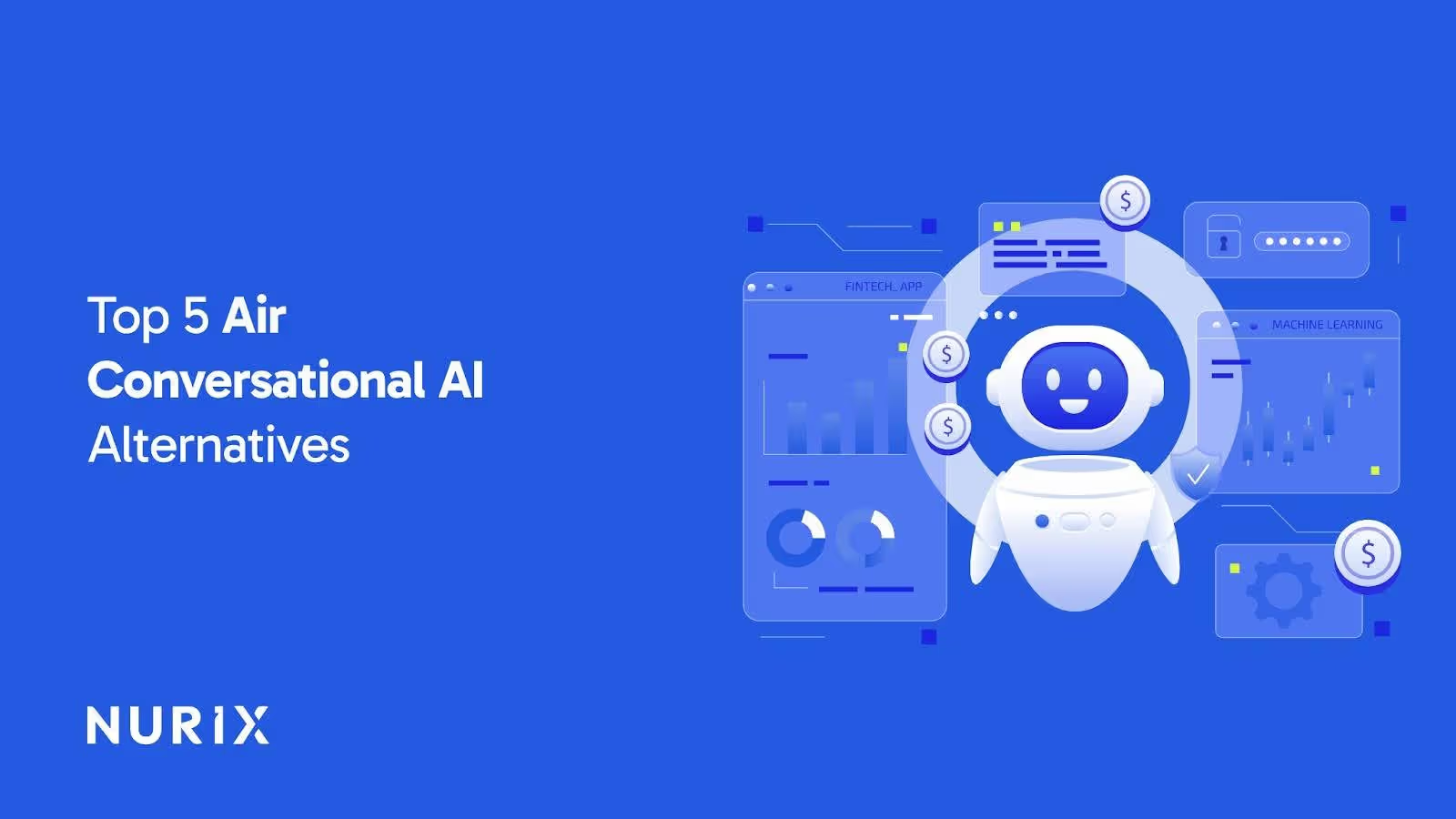How AI for Insurance Agents Is Changing the Game: Tools and Agents You Should Know
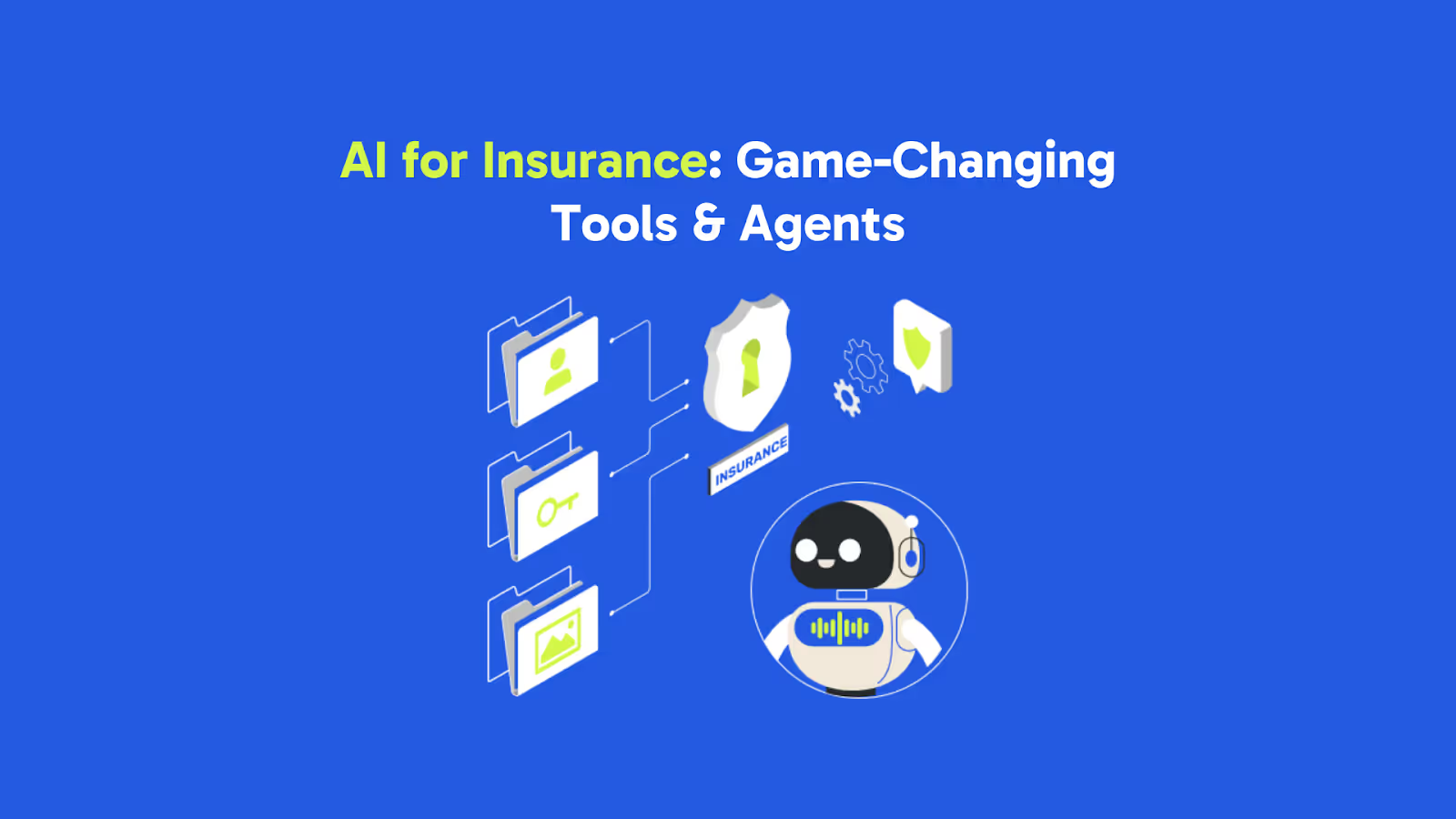
When experience and gut instinct meet a system that can analyze millions of data points instantly, the role of the insurance agent begins to shift in ways few expected. The AI market in insurance jumped from $8 billion in 2024 to nearly $11 billion in 2025, with projections soaring past $140 billion by 2034.
This rapid growth challenges the traditional balance between personal judgment and data-driven insight, forcing agents to reconsider how they build trust, engage clients, and make decisions. As AI quietly weaves into daily workflows, it’s not just changing tools, it’s reshaping what it means to be an insurance agent.
This blog breaks down how AI for insurance agents is making a real difference. From smarter tools to AI agents themselves, here’s what you need to know to stay ahead.
What Are AI Tools and Agents?
AI tools are software solutions that use artificial intelligence to automate, analyze, and optimize insurance processes, such as quoting, underwriting, claims, fraud detection, and customer engagement, helping agents work faster and more accurately.
AI agents are advanced digital systems that mimic human decision-making by taking advantage of machine learning, natural language processing, and predictive analytics to autonomously handle tasks like claims assessment, risk evaluation, customer inquiries, and fraud detection, often operating in real time and at scale.
AI tools and agents form the foundation of a new approach, blending automation with intelligence to support insurance professionals. Their growing presence is quietly influencing every part of the industry’s daily operations and long-term strategies.
How AI Is Changing the Insurance Industry
The insurance sector is quietly shifting beneath the surface, where data flows replace paper trails and intuition meets calculated patterns. This shift is redefining how agents engage with clients and make decisions, opening new pathways in an old industry. Here’s a closer look at what’s unfolding with AI for insurance agents.
Key ways AI is changing insurance:
- Automates underwriting, claims processing, and fraud detection, reducing manual work and errors.
- Enables personalized policy options, pricing, and recommendations through advanced data analysis.
- Improves risk assessment and dynamic pricing by analyzing vast and diverse data sources in real time.
- Streamlines customer onboarding and service with AI-driven chatbots and virtual assistants, offering 24/7 support.
- Improves compliance and regulatory reporting by automating monitoring and analysis tasks.
- Provides actionable insights for better decision-making and proactive risk mitigation.
- Drives operational efficiency and cost savings, helping insurers stay competitive in a rapidly evolving market.
As AI begins to handle more of the behind-the-scenes work, it also opens up new possibilities for how agents connect with their clients. This shift creates space for deeper, more timely interactions that go beyond traditional engagement.
How AI for Insurance Agents Improves Policyholder Engagement
Policyholder engagement is evolving beyond routine check-ins, moving toward conversations shaped by subtle signals and timely insights. This change deepens connections by anticipating needs and responding with nuance. Here’s how AI is part of that shift.
- Smart Lead Prioritization: AI analyzes policyholder behavior and risk profiles to help agents focus on high-value clients who are most likely to renew or purchase additional coverage, optimizing their time and effort.
- Personalized Outreach Campaigns: Using AI-driven segmentation, agents can send tailored messages based on individual life events (e.g., marriage, buying a home) or changing risk factors, making communications timely and relevant.
- Real-Time Claims Assistance: AI-powered virtual assistants integrated into agents’ workflows provide instant answers to policyholders’ claims questions, enabling agents to offer faster, more accurate support without delays.
- Predictive Retention Alerts: AI models predict which policyholders are at risk of lapsing or switching providers, allowing agents to proactively reach out with customized offers or solutions to improve retention.
- Automated Document Processing: AI tools automatically extract and organize policyholder documents, enabling agents to quickly access and explain coverage details, speeding up policy reviews and updates.
- Behavioral Insights for Cross-Selling: By analyzing customer data patterns, AI identifies opportunities for agents to recommend complementary products (e.g., bundling auto and home insurance), increasing policyholder value.
- Sentiment Analysis: AI monitors policyholder feedback from emails, calls, and social media to gauge satisfaction and alert agents to potential issues before they escalate, fostering more empathetic and responsive engagement.
The ways AI for insurance agents deepens connections with policyholders rely heavily on the tools agents use every day. These technologies form the backbone of more personalized and responsive service, making engagement feel more natural and timely.
Top AI Tools for Insurance Agents
The tools insurance agents rely on are quietly shifting from simple organizers to smart collaborators, offering insights and handling tasks that once demanded constant attention. These AI-driven helpers are rewriting the day-to-day rhythm of the work. Here’s what’s standing out.
1. Nurix AI
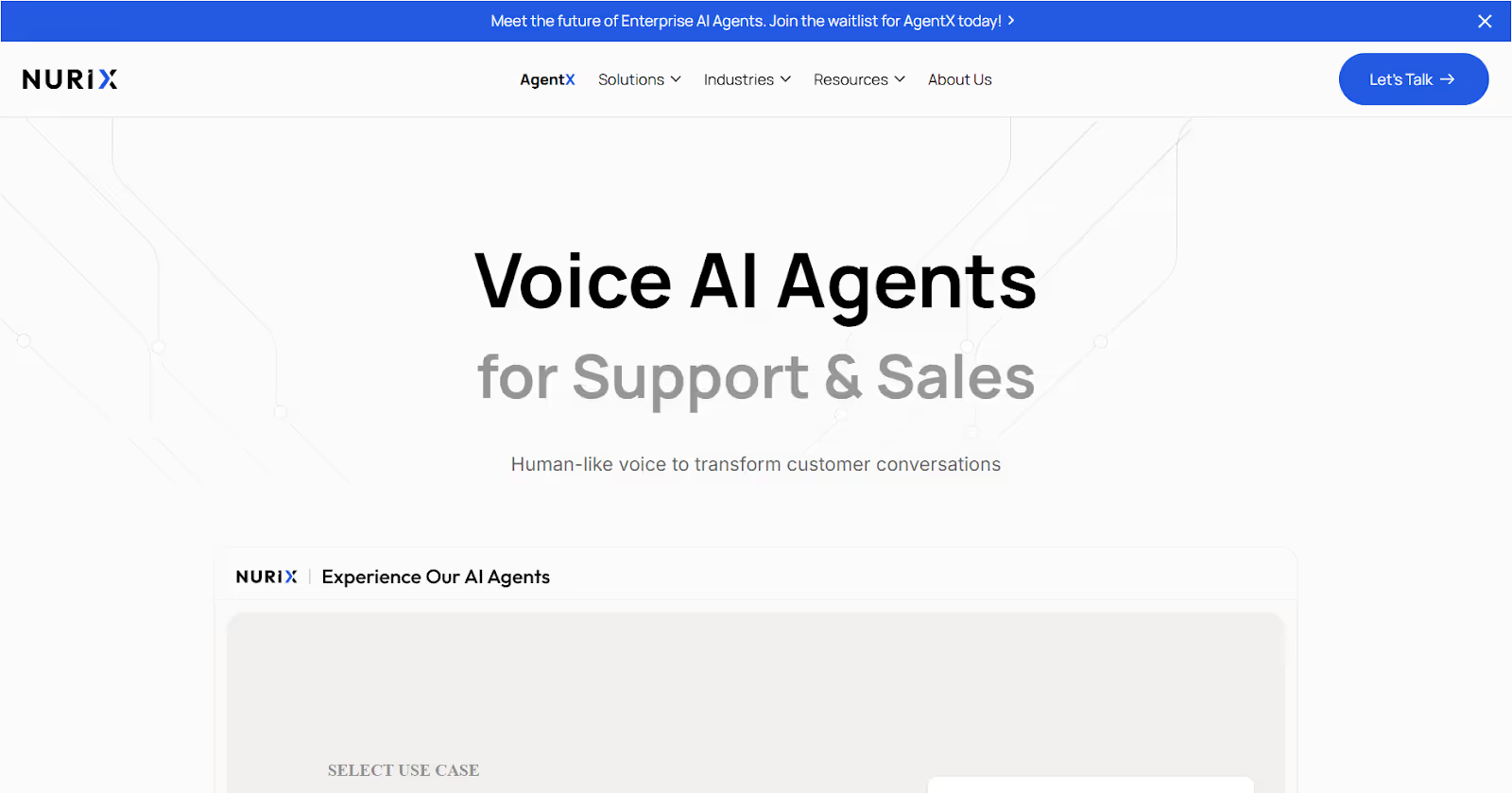
Nurix AI delivers advanced, multimodal AI agents that automate insurance sales, claims, and customer support, integrating smoothly with legacy systems and digital channels. Its platform goes beyond basic chatbots, offering real-time lead qualification, proactive retention campaigns, and document automation tailored for insurance workflows.
- Multimodal FNOL (First Notice of Loss) processing: Accepts claims via voice, chat, and document uploads, triggering automated triage and status updates.
- Dynamic lead scoring: Uses behavioral analytics and policy history to qualify leads and route them to the right agent, boosting conversion rates.
- Proactive renewal and upsell campaigns: AI identifies at-risk policyholders and automatically initiates personalized retention or cross-sell outreach.
- Automated document extraction: Instantly reads, verifies, and files policy documents, KYC forms, and claims evidence, reducing manual data entry.
- Native integration with core insurance systems (CRM, claims, policy admin): Ensures smooth data flow and workflow automation across the organization.
2. Indemn Broker Portal Assistant

Indemn’s AI agent is purpose-built for broker and agent portals, automating 46% of broker inquiries and providing instant, insurance-specific knowledge. It features a human-in-the-loop copilot for complex cases, ensuring accuracy and compliance.
- Insurance-specific knowledge base: Converts appetite documents and marketing materials for precise, context-aware responses.
- Real-time escalation: Instantly routes complex or out-of-scope questions to human CSRs, avoiding frustration.
- Agent Copilot: Allows human experts to join live AI-broker conversations, providing oversight and on-the-fly corrections.
- API-based tracking: Monitors every agent interaction for analytics and compliance reporting.
- Continuous learning: Refines responses based on real feedback, reducing AI hallucinations by 95%.
3. Shift Technology
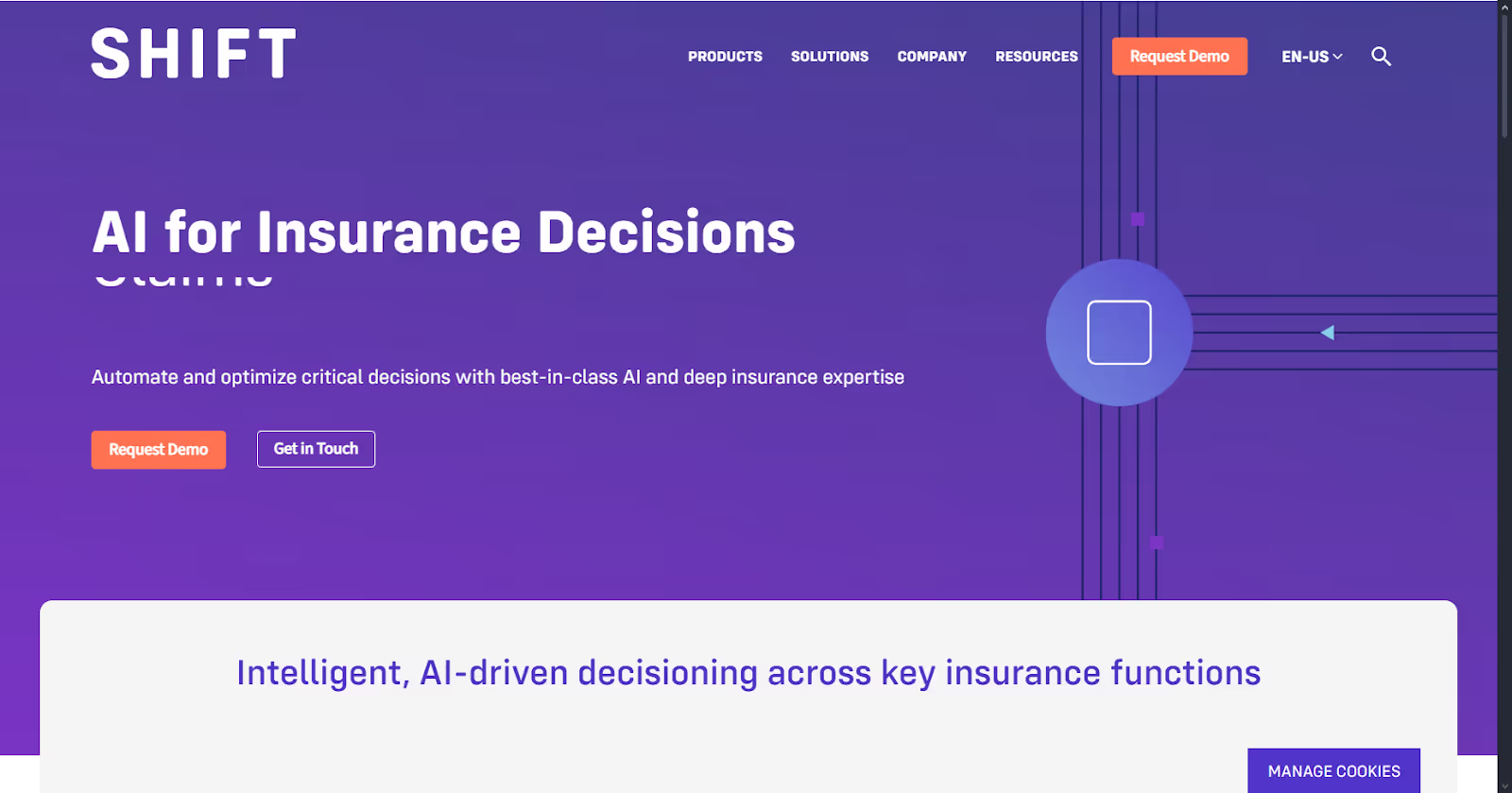
Shift Technology specializes in AI-powered fraud detection and claims automation for global insurers. Its platform analyzes structured and unstructured data to flag anomalies and streamline claims workflows.
- AI-driven fraud scoring: Evaluates every claim using historical and real-time data for fraud risk.
- Automated document analysis: Extracts and verifies information from photos, forms, and emails.
- Anomaly detection: Spots suspicious patterns across claims, policies, and customer profiles.
- Smooth claims triage: Automatically routes claims based on risk and complexity.
- Regulatory audit trail: Maintains detailed logs for compliance and investigation.
4. DRUID AI Agents for Insurance
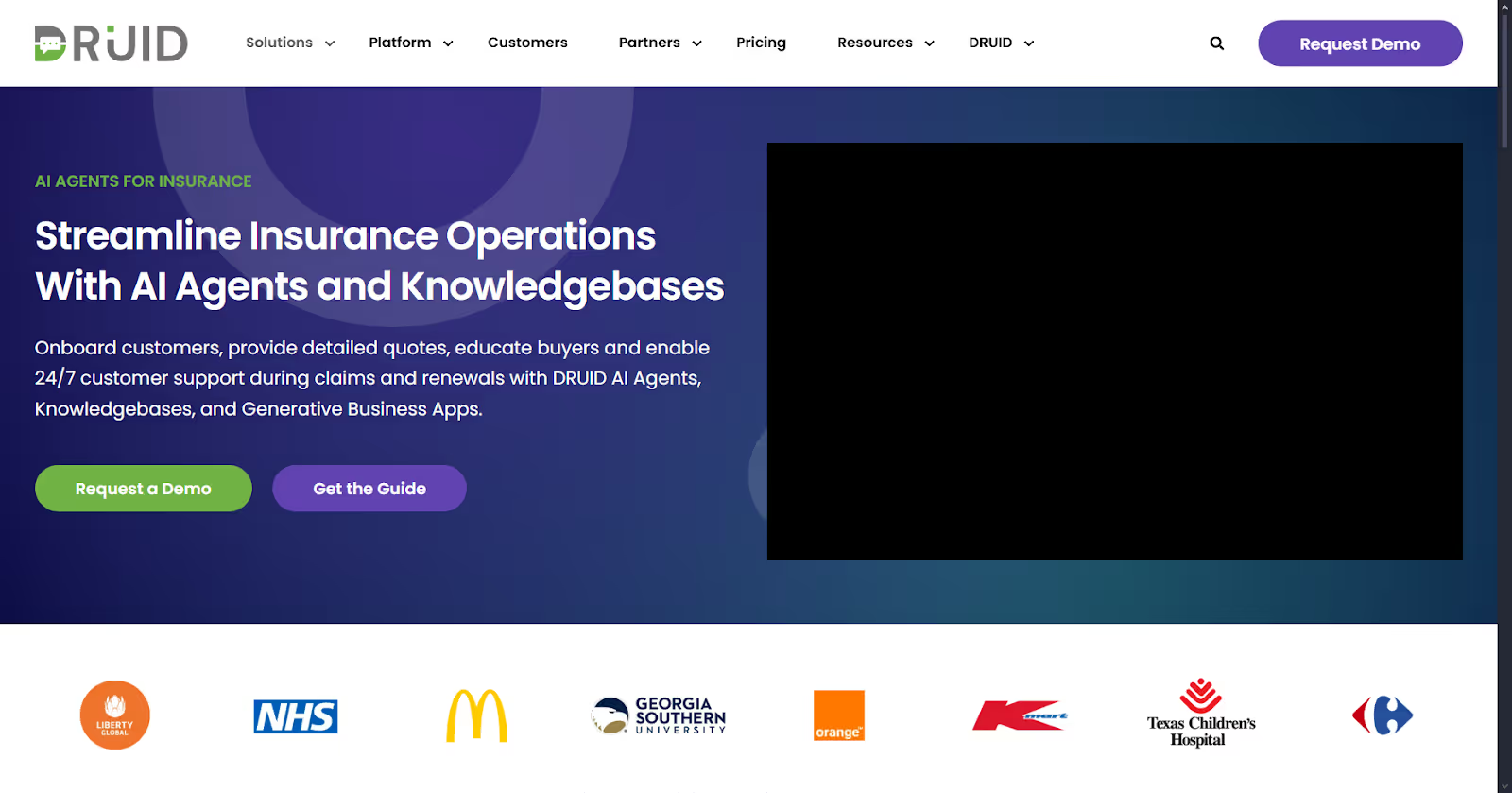
DRUID provides conversational AI agents with pre-built insurance workflows, automating onboarding, quoting, claims, and renewals across multiple channels.
- End-to-end claims automation: Guides policyholders through claims submission, documentation, and status updates.
- Automated quote and bind: Delivers instant, personalized quotes and policy issuance based on real-time data.
- Underwriting support: Analyzes applicant data and risk factors for faster, more accurate decisions.
- Multilingual, omnichannel support: Engages customers via web, mobile, and messaging apps.
- Pre-built insurance templates: Rapid deployment for common insurance processes.
5. Salesforce Einstein for Insurance
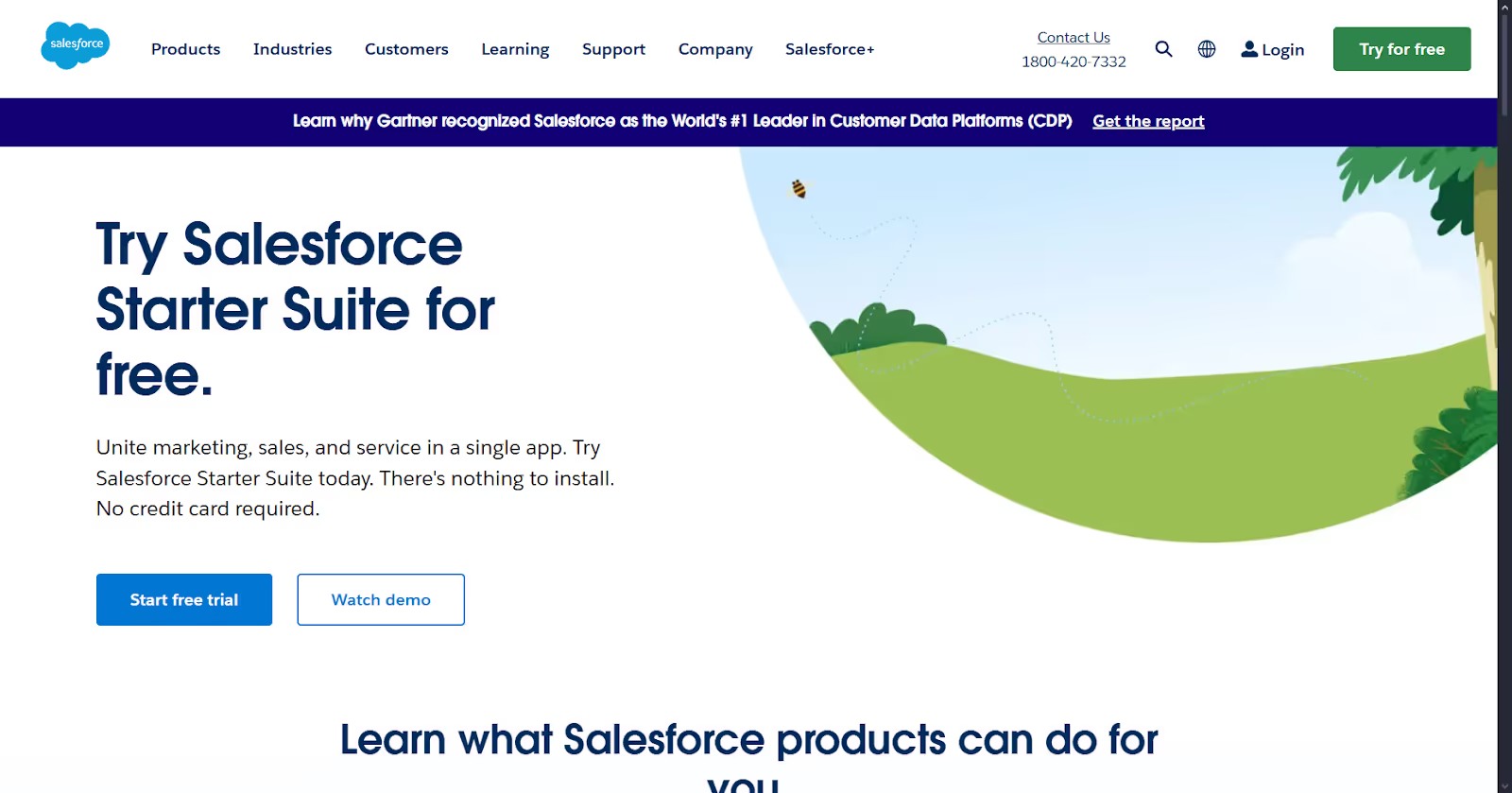
Salesforce Einstein integrates AI into the Salesforce ecosystem, providing predictive analytics, automation, and customer insights tailored for insurance agents.
- Predictive lead scoring: Ranks prospects based on likelihood to convert or churn.
- Automated follow-ups: Schedules and personalizes outreach based on policyholder behavior.
- Sentiment analysis: Monitors customer interactions for satisfaction and escalation triggers.
- Smart task prioritization: Recommends next best actions for agents based on AI insights.
- CRM data integration: Aggregates policy, claims, and communication history for 360° customer views.
The variety of AI for insurance agents tools available sets the stage for how these technologies take shape in real-world tasks. Their practical applications reveal the subtle ways AI supports agents behind the scenes.
AI Agent Use Cases for Insurance Agents
AI agents are stepping into roles that blend support and decision-making, filling gaps that free up human focus for more complex work. Their presence is redefining how insurance gets done, often without drawing much attention. Here’s where AI for insurance agents are making a difference.
1 . Automated Claims Processing and Settlement
AI agents validate and cross-check claim information against multiple databases (e.g., medical records, accident reports) to instantly assess legitimacy, approve straightforward claims within hours, and flag anomalies for human review, dramatically reducing settlement times and manual workload.
2. Fraud Detection and Prevention
By continuously analyzing claims data for suspicious patterns and anomalies, AI agents proactively detect emerging fraud tactics, flagging high-risk claims for further investigation and saving insurers significant losses.
3. Advanced Risk Assessment and Underwriting
AI agents aggregate and analyze vast datasets, such as historical claims, IoT sensor data, and customer profiles, to create granular risk models. This enables more precise, real-time underwriting and dynamic pricing tailored to individual policyholders.
4. 24/7 Customer Support and Engagement
AI-powered virtual assistants provide instant, round-the-clock support across web, mobile, and messaging platforms, handling policy inquiries, guiding customers through claims, and delivering personalized recommendations, freeing agents for complex advisory work.
5. Automated Policy Renewal and Retention
AI agents monitor customer renewal cycles, sending timely, personalized reminders and offers based on behavioral analytics to reduce lapses and improve retention rates.
6. Lead Scoring and Personalized Marketing
By analyzing customer data, engagement history, and market trends, AI agents identify high-potential leads, score them, and trigger targeted marketing campaigns, helping agents prioritize outreach and boost conversion rates.
7. Credit Scoring and Financial Risk Profiling
AI agents take advantage of predictive analytics to assess policyholder creditworthiness in real time, enabling more accurate risk segmentation and tailored product offerings, especially for life and health insurance.
8. Customer Sentiment Analysis
Through analysis of social media, feedback, and communication patterns, AI agents gauge customer sentiment, allowing agents to proactively address dissatisfaction and improve service.
9. Cybersecurity Management
AI agents monitor digital interactions for unusual activity, helping insurers detect and isolate cyber threats before they escalate, thus safeguarding sensitive policyholder data.
Seeing how AI agents fit into daily operations raises questions about what it takes to embed these capabilities into a whole agency. Moving from isolated tools to a unified approach requires a shift in how business gets done.
Building an AI-Powered Insurance Agency
Building an insurance agency around AI involves more than adopting tools. It means reshaping routines, perspectives, and relationships. This subtle shift influences how teams operate and how clients experience service. Here’s what AI for insurance agents looks like.
Key Steps:
- Pinpoint High-Impact Use Cases: Start with claims automation, predictive underwriting, or AI-driven lead scoring, areas with measurable ROI and workflow bottlenecks.
- Integrate, Don’t Isolate: Use APIs and middleware to connect AI tools (e.g., Nurix AI, Shift Technology) directly with your CRM, policy admin, and claims systems.
- Prioritize Data Quality: Clean, structured data from policyholder histories, telematics, and external sources is crucial for accurate AI predictions.
- Pilot and Iterate: Launch with a focused pilot (e.g., automating claims triage for auto policies), measure KPIs like turnaround time and customer NPS, and refine based on real feedback.
- Upskill Your Team: Train agents to use AI insights for personalized outreach and faster decision-making, not just to replace manual tasks.
- Stay Compliant: Build in audit trails and explainability to satisfy regulators and maintain customer trust.
Creating an agency built around AI brings a host of choices that extend beyond technology alone. Making the right decisions about tools means balancing immediate needs with long-term goals and daily realities.
What Insurance Agents Should Consider When Choosing AI Tools
Choosing AI tools calls for more than features and price, it requires a clear sense of how they fit with the unique rhythms of an agent’s work. The right choice quietly supports without disrupting. Here’s what matters most.
- Regulatory Compliance & Data Security: Ensure the tool meets industry standards (like HIPAA, GDPR) and offers robust encryption, audit trails, and access controls to protect sensitive policyholder data.
- Integration with Existing Systems: Prioritize solutions that connect smoothly with your current CRM, policy admin, and claims platforms via APIs, avoiding data silos and workflow disruption.
- Automation Depth & Specialization: Look for tools that go beyond generic automation, such as AI-driven FNOL intake, predictive underwriting, or claims fraud detection tailored for insurance, not just generic chatbots.
- Data Quality & Readiness: Assess whether your agency’s data is clean, structured, and sufficient for the AI tool’s needs; poor data quality can undermine even the best AI solution.
- Scalability & Customization: Choose platforms such as Nurix AI that can handle your agency’s growth and allow for customization to fit specific lines of business or regulatory needs.
- Ease of Use & Support: Opt for tools with intuitive interfaces, minimal technical setup, and strong vendor support to help your team adopt and adapt quickly.
- ROI and Measurable Impact: Evaluate potential cost savings, efficiency gains, and customer service improvements through pilot projects or cost-benefit analysis before full rollout.
Choosing the right AI tools is a critical step, but it’s only one part of a larger story. The true impact will unfold as these technologies continue to influence how agents work and relate to their clients over time.
The Future of AI for Insurance Agents
The path ahead for AI in insurance is unfolding in small, often overlooked steps that steadily change how agents connect, decide, and act. These shifts hint at new roles and possibilities quietly taking shape. Here’s what to watch for.
- Hyper-Personalized Underwriting & Dynamic Pricing: AI will analyze vast behavioral, IoT, and demographic data to create individualized risk profiles and adjust premiums in real time, making one-size-fits-all policies obsolete.
- Agentic AI & Synthetic Teams: AI agents will collaborate with human agents as “synthetic teams,” automating routine tasks and offering real-time recommendations, freeing agents to focus on complex advisory roles.
- Generative AI for Communication & Scenario Modeling: Large language models will power chatbots and virtual assistants capable of nuanced, multilingual policy explanations, claims guidance, and even generating risk scenarios for portfolio stress testing.
- AI-Driven Climate Risk & Preventive Insurance: Advanced models will process satellite, climate, and IoT data to predict and mitigate risks (like floods or wildfires), enabling agents to offer preventive advice and early warnings to clients.
- Automated Document Processing at Scale: Next-gen AI will handle high-volume, complex document reviews, summarizing medical records or multi-format claims files, dramatically speeding up claims and reducing errors.
- Next Best Action Recommendations: AI will suggest precise, data-driven actions to agents during underwriting and claims management, based on real-time analysis of client and market data.
- Regulatory-Ready, Explainable AI: Tools will include built-in transparency and auditability to meet evolving regulatory standards, with explainable AI ensuring fair, ethical, and compliant decision-making.
- Integration with Wearables & IoT: Agents will take advantage of data from client wearables and smart devices for real-time risk monitoring, personalized engagement, and dynamic policy adjustments.
Conclusion
As AI becomes a part of everyday insurance work, agents face a new challenge; redefining their role beyond traditional skills. Experience and intuition remain important, but blending them with fresh data perspectives will set the stage for lasting success. The real shift isn’t whether AI changes the industry, it’s how agents respond to a world where routine tasks fade and human qualities like judgment and empathy become central. The future belongs to those who find balance in this new partnership and lead the way forward.
Ready to step into the future of insurance with Nurix AI? Our platform empowers agents to make smarter decisions faster by automating routine tasks, delivering precise insights, and improving client engagement, all while keeping the human touch intact.
Experience how Nurix AI transforms everyday workflows into opportunities for deeper connections and better outcomes. Get in touch with us today!
FAQs About AI Tools and Agents in Insurance Industries
1. How do AI agents handle complex or ambiguous customer queries without human intervention?
AI agents use advanced natural language processing combined with contextual learning to interpret subtle nuances in customer questions. When faced with ambiguity, they draw on historical interaction data and behavioral patterns to offer relevant responses. If uncertainty remains, they smoothly escalate the issue to human agents, ensuring no customer is left without accurate support.
2. Can AI tools in insurance detect fraudulent claims better than traditional methods?
Yes, AI for insurance agents tools analyze vast datasets in real-time, spotting patterns and anomalies that might elude human auditors. They use machine learning models trained on historical fraud cases to flag suspicious activities early, reducing false positives while improving detection rates. This proactive approach shortens claim cycles and protects the agency’s bottom line.
3. How does AI integration impact the workload and skill set required for insurance agents?
Rather than replacing agents, AI shifts their focus from administrative tasks to more strategic, relationship-driven roles. Agents need to develop skills in interpreting AI-generated insights and managing more complex client needs, which calls for ongoing training but also opens paths to higher-value work.
4. What role does AI play in personalizing insurance products for different customer segments?
AI analyzes customer data beyond demographics, including behaviors and preferences, to create nuanced profiles. This enables agencies to offer products that closely match individual risk profiles and life circumstances, leading to better satisfaction and retention, while maintaining regulatory compliance.
5. How do AI tools ensure data privacy and compliance in insurance operations?
Modern AI platforms embed encryption and anonymization techniques at their core, ensuring sensitive information stays protected throughout processing. They also maintain detailed audit trails and comply with industry regulations, allowing agencies to confidently use AI while upholding client trust and legal standards.


